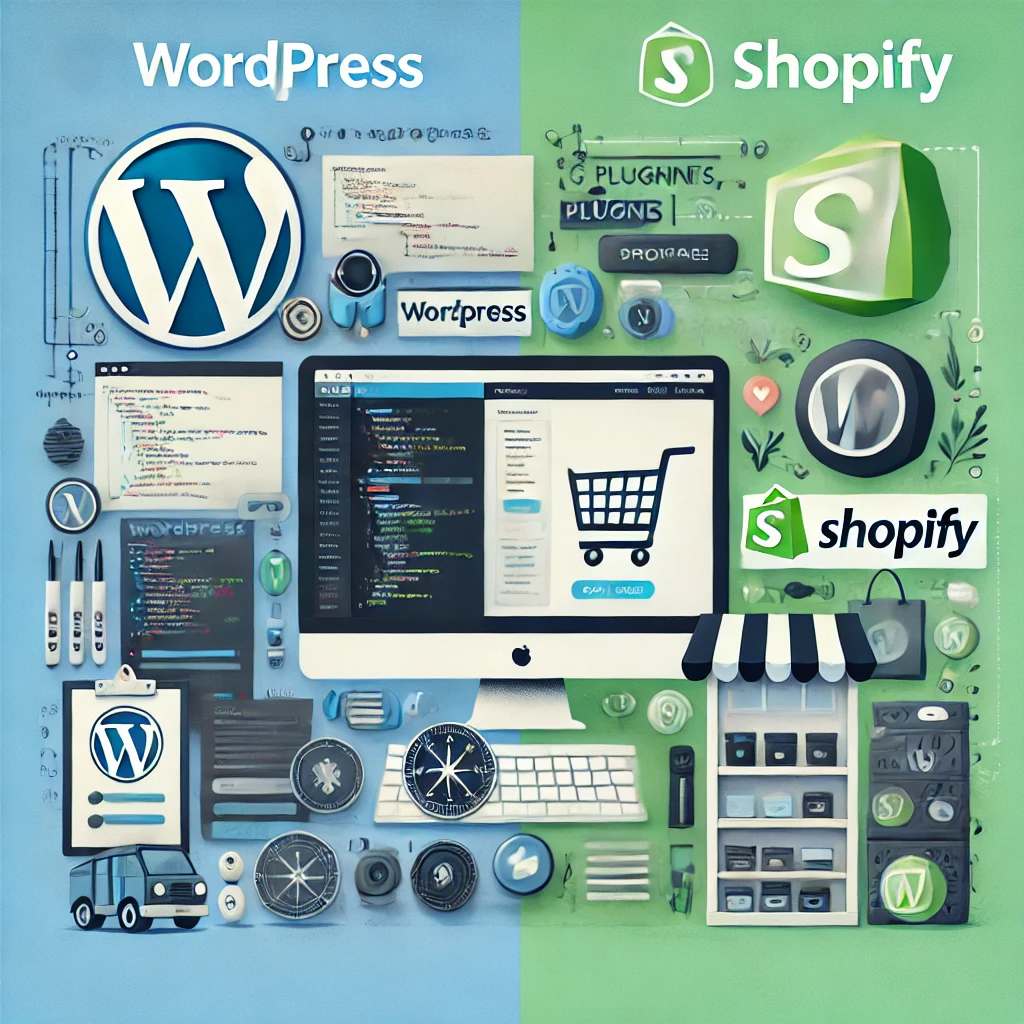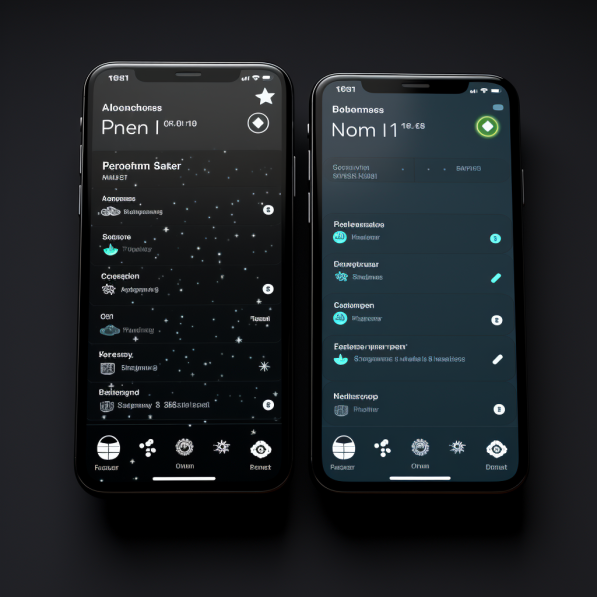wordpress vs shopify

What’s Best WordPress or Shopify?
When it comes to choosing which CMS platform to use when building an online store, generally, there are two which you first spring to mind; those are WordPress and shopify.
WordPress and shopify arguably the most popular platforms you can use to build your website, WordPress is versatile, and it’s very flexible and Powerful with it’s range of plugins, and accounts for around 40% of our websites.
On the other hand shopify, is a dedicated e-commerce platform, more often than not used to sell products online, again relatively simple to use and also as upscale options just like WordPress in terms of add-ons.

| 
|

| 
|
So what do you choose WordPress are shopify?
This is a critical decision to make before you begin designing and creating your online business. the decision will send you in the direction of how you wish to give the experience to your user and what functionality you will be using along the way, as well as also keeping in mind the cost and scalability of your business
Choosing the right platform is crucial for the success of your online store. The decision impacts everything from the user experience and functionality to the long-term costs and scalability of your business. With so many factors to consider, it’s essential to understand how these two platforms stack up against each other.
Still confused? Don’t worry. Let’s Dig a little deeper! 🙂
Ease of Use
WordPress:
WordPress offers flexibility of the highest order, it’s allows users to create websites which are highly customisable, with literally endless possibilities. now you could buy all means go down the path of keeping costs slow to the point where it’s practically free, but the complexity does increase doing it this way.
Alternatively, if you do make use of its huge plethora of plugins, then the complexity Can’t inevitably come down however then you’re costs will also likely go up, as you pay for the privilege of decreasing the complex of WordPress, not that I believe WordPress is overly Complex in the first place!
Setting up a WordPress store does require processes such as using hosting and installing WordPress itself. this is not a huge technical hurdle, just simply requires a bit of knowledge to get your per running.
Shopify:
Now when it comes to shopify, it is themed around helping beginners from the get-go. the platform is very user friendly and even simplifies the process of setting up.
Shopify Focus from the start, from choosing your domain, setting up a launching your store all on a single dashboard, if it’s simplicity or after then shopify maybe one to consider for you.
It also comes with a lot of drag and drop user interface, and prebuilt themes, eliminating much of technical skills required to customise your website.
Shopify is an ideal way to begin from a newbie perspective; it takes your hand and leads you every step of the way.
| Feature | WordPress | Shopify |
|---|---|---|
| Ease of Use | Greater flexibility but with a steeper learning curve, suited for those with technical expertise. | User-friendly, designed for beginners seeking a quick and simple setup. |
| Customization Options | Excels in customization with thousands of themes and plugins; requires more effort and technical knowledge. | Streamlined and accessible customization with fewer options compared to WordPress. |
| Cost | Initially cost-effective, but expenses can increase with premium themes, plugins, and maintenance. | Predictable monthly costs including hosting and essential e-commerce features; higher-tier plans and paid apps can increase expenses. |
| E-commerce Features | Extensive e-commerce capabilities with plugins like WooCommerce; requires more setup and management. | Built-in e-commerce functionality ready to use out of the box, focusing on simplicity and efficiency. |
| SEO and Marketing Tools | Strong SEO and marketing tools with flexibility through plugins. | Integrated, user-friendly SEO and marketing tools. |
| Security | Users manage their own security, which can be complex and time-consuming. | Built-in security protections and automatic updates, safer for non-technical users. |
| Support and Community | Large, active community with extensive online resources; support is community-driven. | Dedicated customer support, active user community, and comprehensive documentation. |
| Scalability | Highly scalable with the right resources, but may require more investment in hosting and development. | Easy to scale with built-in tools, though costs can rise with higher-tier plans and additional apps. |
This table should provide a clear and concise comparison between WordPress and Shopify across various key aspects.
Key Differences in the Setup Process:
Having used both platforms in the past, there is definitely to differences between the platforms when it comes to setting them up, but..
Which process do I prefer?
WordPress does offer more customisation, there is also a steeper learning curve admittedly, and I give like can take more time to set up, especially if this year first website because you will have to learn how to set it up.
Shopify, on the other hand, is more straightforward and does help you more along the way, you could almost call it hassle free. you can do the full process all in one place, so from my beginners perspective this website platform would be better.
While WordPress offers more control and customization, it requires a steeper learning curve and more time to set up. Shopify, on the other hand, provides a more straightforward, hassle-free experience, allowing users to get their store up and running with minimal effort. The choice between the two often comes down to whether you prioritize flexibility and control or simplicity and ease of use.
Customization Options
WordPress:
When it comes to WordPress, in my view it is the leader when it comes to customisation of versatility. there are literally 1000 of themes and plugins available on WordPress, the limitations are our our most non-existent, whatever kind of store you want, online business or whatever, using WordPress will get you there, I’ll be it some form of learning curve will be required.
Plugins like WooCommerce add robust e-commerce capabilities to WordPress, while others can extend functionality for SEO, marketing, social media integration, and more.
It’s important to keep in mind that some levels of customisation to a WordPress site often involve tweaking code, managing multiple plugins, and ensuring compatibility between different elements. This can be time-consuming, sometimes of this low overwhelming and may require the assistance of a developer, especially for more complex customizations.
Shopify:
Shopify offers a more streamlined approach to customization. you can expect to find both free and paid themes, both designed with user-friendliness in mind and always work well in a e-commerce setting.
While the range of themes is not as extensive as WordPress, as WordPress will always outperform shopify when it comes to customisation, but, Shopify’s themes are responsive and easy to customize through the drag-and-drop interface.
Although shopify doesn’t offer the same granular control of what a WordPress website does, it does take you by the hand more and make things more simple, and removing more of the technical element, which scares a lot of new users.
| Platform | Situational Recommendation |
|---|
| When to Choose WordPress | – If you need a highly customized online store. – If you have specific design or functionality requirements. – If you possess the technical skills or resources to manage a more complex platform. – If you are already familiar with WordPress and want to integrate e-commerce into an existing WordPress site. |
| When to Choose Shopify | – If you want a straightforward, all-in-one solution with minimal setup time and technical hassle. – Ideal for small to medium-sized businesses that prioritize ease of use and reliability. – Best for entrepreneurs who want to launch their online store quickly and efficiently without worrying about the technical details. |
Pros and Cons of Each Approach:
WordPress’s customization options are more extensive but come with increased complexity and a steeper learning curve. It’s ideal for those who want complete control over their site’s design and functionality. Shopify, while more limited in customization, offers a simpler, more user-friendly approach that allows users to create a polished store without deep technical knowledge. The choice here hinges on whether you need extensive customization or prefer a quicker, easier setup.
Cost
WordPress:
When it comes to setting up a WordPress website, the range of costs can vary significantly depending on, your needs, goals and ambitions.
Yes, you can buy our means set up a free WordPress website entirely ( aside from domain and hosting costs). however, as mentioned you will still be left with a degree of complexity or website if you want to fully customise it.
With WordPress you pay for the privilege of less complexity when you purchase plugins, that’s one way of looking at WordPress.
While it’s possible to keep costs low with careful management, the total cost of ownership can quickly add up, especially as your store grows. But often that is a nice problem to have 🙂
Shopify:
Shopify, as we have covered is no doubt great for beginners, due to it’s user friendly processes and user interface. however, on light WordPress this does inevitably come with an extra cost.
Shopify uses a subscription-based pricing model, with plans ranging from $39 to $399 per month.
All plans include hosting, SSL certificates, and access to essential e-commerce features. T
There are no additional costs for themes or apps, although premium options in the Shopify Theme Store or App Store can add to your expenses.
Shopify also charges transaction fees if you don’t use Shopify Payments, their in-house payment gateway.
Although shopify is still highly recommended, especially if you’re new to the online website building world, do keep in mind you have to be most stringent with your budget, as costs will likely build up more.
If costs are not an issue, but the reduction of complexity is, shopify is highly recommended.
For additional Hidden Costs of Starting up a Webiste CLick Here
Cost Comparison:
So in a nutshell, WordPress can be more cost-effective initially at least. However, as your store grows, the costs for maintenance, security, and premium features can increase, which wont be a bad thing if you have money coming in form the business.
With Shopify, whilst more expensive on a monthly basis, it doesn’t mean if is easier to use, and takes out a lot of the technical hassle of setting up, perfect for newbies.
The decision ultimately depends on your budget, the scale of your store, and whether you prefer a more customizable or an all-inclusive platform.
My Final Thoughts:
As biased as I may be as a WordPress advocate, I can’t deny that Shopify is a solid platform and is ideal for people just starting out on their online business adventure.
Yes, additional costs may be involved, but I will admit that the Shopify platform’s overall landscape is a bit easier than WordPress.
I do argue, however, that WordPress has far more scope to scalability and flexibility with almost limitless customisation, but it’s a fair argument to state that if you was to include all of this with WordPress then the cost could even out as both platforms get upgraded.
So there you have it, the WordPress Vs Shopify debate, I hope you find this useful, and good luck whatever platform you choose! 🙂
Finding the right balance means considering your long-term goals, the resources you have at your disposal, and the importance of ease of use versus customization. Both platforms are powerful in their own right, so the best choice is the one that aligns most closely with your business objectives and capabilities.
More Like this:
If you liked this post, then feel free to see our comparison between WordPress and Drupal.







